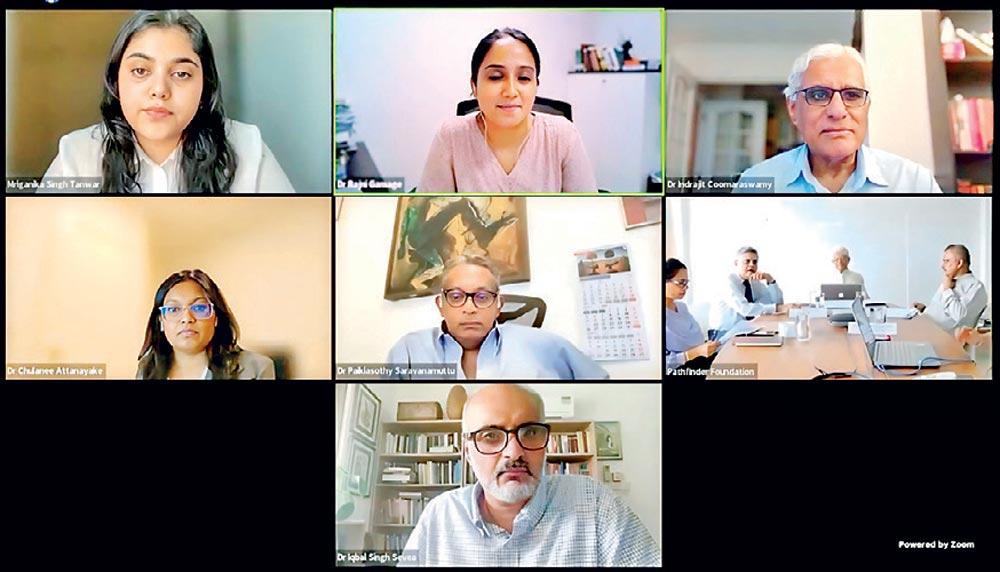20 Aug 2024 - {{hitsCtrl.values.hits}}

Dr. Rajni Gamage, Research Fellow, Institute of South Asian Studies, National University of Singapore, Dr. Indrajit Coomaraswamy, Former Governor, Dr. Chulanee Attanayake, National University of Singapore, Dr. Paikiasothy Saravanamuttu, Executive Director, Centre for Policy Alternatives, and Associate Professor Iqbal Singh Sevea, Director, Institute of South Asian Studies, National University of Singapore participated at the webinar
The Pathfinder Foundation (PF) and the Institute of South Asian Studies (ISAS) at the National University of Singapore jointly hosted a comprehensive webinar focusing on the domestic politics of South Asia, with a special emphasis on Sri Lanka. The webinar, held at the River Point, Head Quarters of the PF brought together leading experts to explore the socio-economic and political challenges faced by Sri Lanka as the nation approaches the Presidential Election on 21st September.
The webinar featured distinguished speakers, each providing unique insights into the multifaceted political and economic issues that will shape Sri Lanka’s future.
Dr. Rajni Gamage, Research Fellow at ISAS, delved into the current political landscape in Sri Lanka and the indicative policy agenda of leading presidential candidates and political parties that would be employed to address the development challenges the country faces. She emphasised the importance of the election, the first since the severe economic crisis, noting that it is being held under intense public scrutiny. Dr. Gamage highlighted that several prominent political leaders were contesting in an environment where the electorate was more vigilant than ever.
Dr. Indrajit Coomaraswamy, former Governor of the Central Bank of Sri Lanka and Distinguished Fellow (PF), speaking on current socio-economic dynamics in Sri Lanka, concentrated on three crucial areas, namely, recent macro-economic performance and policies, poverty dynamics in the country and the need for addressing corruption vulnerabilities. He highlighted that in terms of macroeconomic management, there has been an impressive turnaround in the economy. These include economic growth turning into positive after six quarters of consecutive negative contraction, dramatic reduction in both inflation and interest rates, healthy performance in government revenue collection and impressive build-up of external foreign reserve, which was precariously low at US$ 20 million at the time of the crisis has now reached US$ 5.6 billion. He further underscored the importance of continued commitment to implementing the IMF reform package under the Extended Fund Facility (EFF), of which two reviews have been completed. Finally, he emphasised that the slogan for the next new government should be “consensus and consistency’’ in implementing the economic policy reform framework that has been agreed to achieve economic growth targets and stability.
Addressing the socio-political undercurrents, Dr. Paikiasothy Saravanamuttu, Executive Director of the Centre for Policy Alternatives, provided insights into the rise of populism in Sri Lanka. He highlighted the potential backlash political parties may face if they fail to deliver their promises. Dr. Saravanamuttu emphasised the necessity of strong and decisive leadership to navigate the complexities of the current political environment, warning that the stakes are higher than ever in the upcoming elections.
Dr. Chulanee Attanayake, a Non-Resident Fellow at ISAS, offered a comprehensive analysis of regional geopolitics and its potential impact on Sri Lanka’s elections. She examined the influence of global superpowers, focusing on India, China, and the United States on the next government. Dr. Attanayake highlighted the strategic importance of Sri Lanka within the broader South Asian context and discussed how regional dynamics could shape the country’s political and economic future.
The webinar saw active participation from a diverse audience, including academics, policy analysts, and regional experts. The Q&A sessions were particularly engaging, with participants posing several focused questions on the implications of Sri Lanka’s political dynamics, its foreign policy, the role of political parties in shaping the electoral landscape, and the potential outcome of the Presidential Election.
The Presidential Election is poised to be a pivotal moment for Sri Lanka, marking the first major political event after the country’s economic crisis. As highlighted during the webinar, the next government will face the dual challenges of firm commitment to growth-enhancing economic reforms while ensuring a delicate balance to manage geopolitical pressures.
01 Jan 2025 2 hours ago
01 Jan 2025 3 hours ago
01 Jan 2025 3 hours ago
01 Jan 2025 3 hours ago
01 Jan 2025 3 hours ago